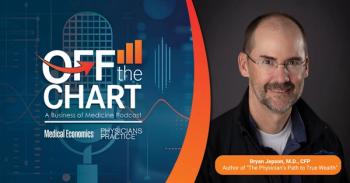
Dating Guide for the Always On Call
Even when you're working nonstop, there's always time for love.
When Sarah Parrott was in her early thirties, most of her single girlfriends spent at least two or three nights a week meeting guys, enjoying dinner dates, or otherwise socializing.
But Parrott, a Kansas City family medicine practitioner, had just finished medical school and was in the midst of a grueling internship. She had only one free evening per week to share with her boyfriend.
"So what we arranged was that I would see him on my one day off a week, and anything beyond that, he would have to come to me," says Parrott. "If I was working a 36-hour shift, he'd come by and kiss me on the forehead and tuck me into bed."
Parrott recognized that someone so flexible is a keeper, so she married him. Unfortunately, many other single physicians - despite their good looks, earning power, and big brains - stay that way a lot longer than they would prefer.
Dating is tough when you're always on call, and it's tougher today for doctors than ever before.
With the median age of first marriage now over 25 for both men and women in the United States, according to 2010 Census Bureau data, it's clear that young people of all vocations are waiting longer to tie the knot than their parents did. The physician dating pool has also been changed by the fact that women have outnumbered men in American medical schools for most of the last decade. In previous generations, the long hours worked by the mostly male young doctors were tolerated by their partners as simply part of the deal. The payoff was the promise of future high earnings and hours that would, in time, become more manageable.
But today's young doctors, most of them women, don't want to waste their youth working a backbreaking schedule, in part because they'd like to have children and don't think they can afford to wait.
Lucky for you, a few adjustments and sincere dedication can get your love life on track. (Hint: Wearing your scrubs to dinner is not an aphrodisiac).
Doctors' dating challenges
The biggest obstacle young physicians face when it comes to finding a mate: lack of time. They might have one free night a week - the rest of their time is spent with coworkers. "A lot of doctors don't have the opportunity to get outside their professional circle and meet new people," says Christie Nightingale, principal of concierge dating service Premier Match, LLC, which caters to busy professionals who don't have time to scout for dates. "They tell me 'I don't have time to go out and go to bars.'"
There's also the fear of intimidating a potential date.
Heidi Huser, a family practitioner who works in a Minnesota urgent care facility, considers herself a catch - funny, smart, stable, and easygoing. But some of those qualities make her male suitors insecure, says the 39-year-old.
"One guy I went to dinner with brought his pay stub," she recalls. "He was worried that I didn't think he made a lot of money … I don't think he could handle the fact that I make good money for what I do."
Still, she's hopeful Mr. Right is out there, and she's willing to take further action (like signing up for a more personalized dating service) to meet him. Though Huser recently scaled back to 32 hours a week, many of the hours she works are on evenings and weekends, also known as prime-time dating hours.
Like Huser, 29-year-old Brittany Christophersen, a registered diet technician and aspiring physician's assistant who recently completed her clinical internship and now works at a major metropolitan hospital in Connecticut, says she has trouble meeting a man who understands her chaotic schedule and long hours.
"I have been flat out given ultimatums, and I've been broken up with twice because of my career," says Christophersen, recalling her recent breakup with a guy who was concerned that her grueling career would get in the way of having and raising children. "He said, 'I want to know if you can scale it back or it isn't gonna work,'" she says. "He told me I was selfish, I was cold, I didn't like children."
The trend of more women becoming physicians has had other ripple effects on the doctor's dating world. About 16 percent of 1,323 physicians who participated in our 2010 Great American Physician Survey said their spouse or significant other is also a physician. It seems natural, given how much time they spend together at work. But for many physicians, dating a fellow doctor comes with its own challenges - think long hours, rigid schedules, and free time spent catching up on sleep, times two.
Getting to your first date
The good news for doctors who expect to work weekends and get paged at 3 a.m. at some point in the near future is that life does get easier, says Parrott. Translation: You'll have more opportunities to meet someone and go on dates, even if you're no longer treated to med-school mixers.
Melissa Brown, president of national dating service It's Just Lunch, which counts a growing number of doctors in its client base, suggests committing to at least a few hours a week for dating whether you're just starting your residency or are an established doctor.
Nightingale recalls a recent experience, where a physician client of hers, based in Baltimore, canceled several Friday night dates in a row.
"It was just a nightmare, and the fellow I was trying to set her up with said 'She cancelled on me twice already, I don't know if this is going to work out,'" says Nightingale. "That's where I have to call the doctor and say, 'Do you have the time to invest in dating?' We finally had them meet on a Tuesday night, and they really hit it off with one another."
When you finally do score a date, whether through a friend, matchmaking service, or chance encounter in a hospital parking lot at 4 a.m., try to lay out some ground rules.
"If you know your schedule ahead of time, you should be able to say, 'Hey, there's an 80 percent chance I'll be available but there's a 20 percent chance I'll have to reschedule,'" says Sarah Kawasaki, a Baltimore-based, 35-year-old internal medicine resident who had to do just that while dating her husband.
Another idea: If you're going on a dinner date, pick restaurants close to your practice or hospital.
"I think location would definitely help make more time," says Brown. "If you don't have to travel half an hour or 45 minutes to get to your date, you can definitely spend half an hour or 45 minutes at your date."
And if you can't find a free night for dinner, consider embracing nontraditional first dates, like breakfast at a diner or an afternoon workout.
"I've had dates in the hospital cafeteria," says Christophersen. "It's not ideal, but it's something."
Rules while on the date
Okay, so you've scored a date. Hooray! But before you yank off the stethoscope and head out the door, you'll need to keep a few things in mind:
Clean up before you go out. Because you work long hours, chances are you'll go straight from work to a dinner date. That's why it's important to bring grooming supplies to work. Nightingale suggests keeping a clean pair of slacks or skirt at your practice, and bringing anything else that spruces up your look (such as cologne, makeup, or a curling iron). "Even though you've had a long shift, wear something nice, and don't come into the date looking haggard," says Nightingale. "Look fresh and alive, and not like you've been on a 14-hour shift."
Practice common courtesy. If possible, try to get to know your date without distraction. That means cutting communications with your practice as much as possible, even if only for three hours. "Turn off your cell phone, turn off your pager, and focus on the person you are meeting with," says Brown.
Drop the medical jargon. Do you like hanging out with people who talk about themselves all the time? As engrossing as your career is, your date won't be too pleased if you talk excessively about your job and how hard, stressful, and fascinating it is. Warning: If you're dating another doctor, this can be hard to do. To make their time together (and away from the hospital) more meaningful while they were dating, Kawasaki says she and her doctor husband made sure "we had time spent not talking about med school, and that we had vacations." Movie dates helped.
If one date doesn't lead to long-term romance, you should try to schedule time each week specifically for dating and enhancing your personal life, says Brown. "The biggest tip is to remember to have fun and to have balance in your life."
And know that, most likely, you'll meet someone special.
"Relax, you're a doctor," says Kawasaki. "People are going to want to date you."
Marisa Torrieri, MS, is an associate editor at Physicians Practice. She has covered the single life for a number of national media outlets. She may be reached at
This article originally appeared in the April 2011 issue of Physicians Practice.
Newsletter
Optimize your practice with the Physicians Practice newsletter, offering management pearls, leadership tips, and business strategies tailored for practice administrators and physicians of any specialty.








